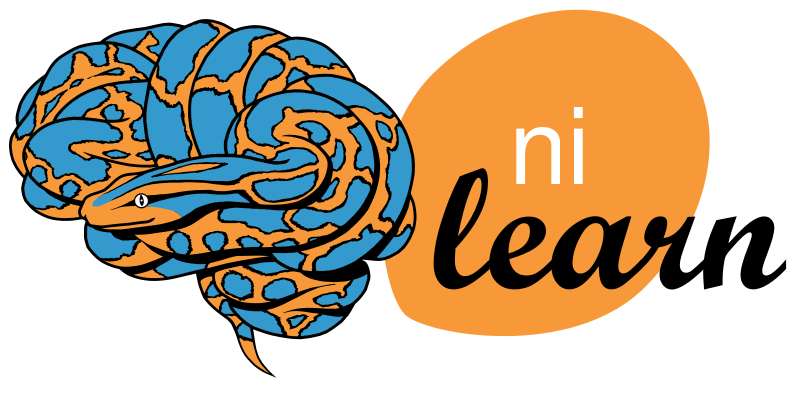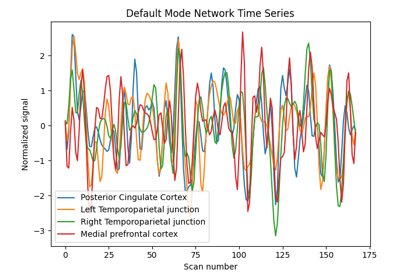Note
This page is a reference documentation. It only explains the function signature, and not how to use it. Please refer to the user guide for the big picture.
8.10.14. nilearn.plotting.plot_markers¶
- nilearn.plotting.plot_markers(node_values, node_coords, node_size='auto', node_cmap=<matplotlib.colors.ListedColormap object>, node_vmin=None, node_vmax=None, node_threshold=None, alpha=0.7, output_file=None, display_mode='ortho', figure=None, axes=None, title=None, annotate=True, black_bg=False, node_kwargs=None, colorbar=True)[source]¶
Plot network nodes (markers) on top of the brain glass schematics.
Nodes are color coded according to provided nodal measure. Nodal measure usually represents some notion of node importance.
- Parameters
- node_valuesarray_like of length n
Vector containing nodal importance measure. Each node will be colored according to corresponding node value.
- node_coordsnumpy array_like of shape (n, 3)
3d coordinates of the graph nodes in world space.
- node_size‘auto’ or scalar or array-like, optional
Size(s) of the nodes in points^2. By default the size of the node is inversely proportional to the number of nodes.
- node_cmapstr or colormap, optional
Colormap used to represent the node measure. Default=plt.cm.viridis_r.
- node_vminfloat, optional
Lower bound of the colormap. If None, the min of the node_values is used.
- node_vmaxfloat, optional
Upper bound of the colormap. If None, the min of the node_values is used.
- node_thresholdfloat
If provided only the nodes with a value greater than node_threshold will be shown.
- alphafloat between 0 and 1, optional
Alpha transparency for markers. Default=0.7.
- output_file
str, or None, optional The name of an image file to export the plot to. Valid extensions are .png, .pdf, .svg. If
output_fileis not None, the plot is saved to a file, and the display is closed.- display_modestring, optional
Choose the direction of the cuts: ‘x’ - sagittal, ‘y’ - coronal, ‘z’ - axial, ‘l’ - sagittal left hemisphere only, ‘r’ - sagittal right hemisphere only, ‘ortho’ - three cuts are performed in orthogonal directions. Possible values are: ‘ortho’, ‘x’, ‘y’, ‘z’, ‘xz’, ‘yx’, ‘yz’, ‘l’, ‘r’, ‘lr’, ‘lzr’, ‘lyr’, ‘lzry’, ‘lyrz’. Default=’ortho’.
- figure
int, ormatplotlib.figure.Figure, or None, optional Matplotlib figure used or its number. If
Noneis given, a new figure is created.- axes
matplotlib.axes.Axes, or 4 tupleoffloat: (xmin, ymin, width, height), optional The axes, or the coordinates, in matplotlib figure space, of the axes used to display the plot. If
None, the complete figure is used.- title
str, or None, optional The title displayed on the figure. Default=None.
- annotate
bool, optional If
annotateisTrue, positions and left/right annotation are added to the plot. Default=True.- black_bg
bool, or ‘auto’, optional If
True, the background of the image is set to be black. If you wish to save figures with a black background, you will need to pass facecolor=’k’, edgecolor=’k’ tomatplotlib.pyplot.savefig. Default=False.- node_kwargsdict, optional
will be passed as kwargs to the plt.scatter call that plots all the nodes in one go
- colorbar
bool, optional If
True, display a colorbar on the right of the plots. Default=True.

